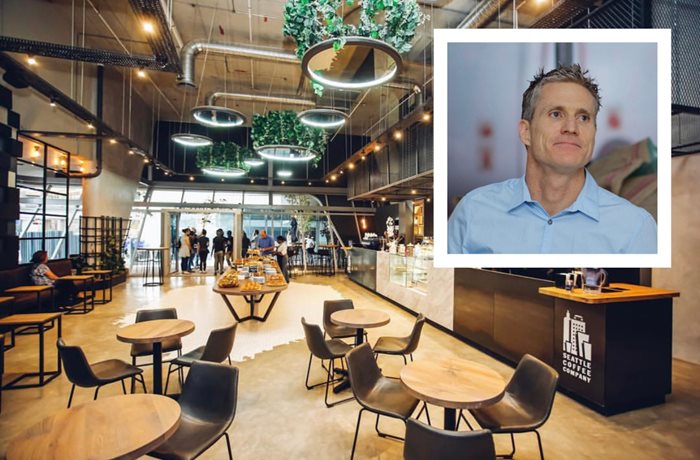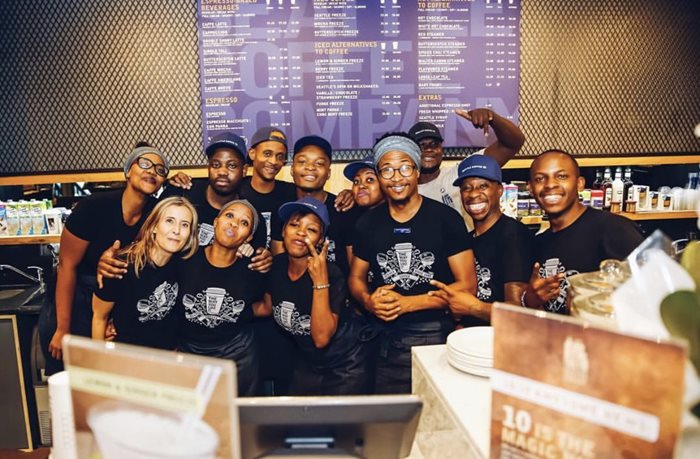Peter Howie, Director and Co-founder of Seattle Coffee Company, reveals the remarkable story behind developing one of South Africa’s most successful coffee chains and how the brand strives to make the artisanal an everyday experience

Peter Howie (pictured above) and his business partner, Barry Parker, founded Seattle Coffee Company together in South Africa in the late 90s
Peter Howie knows South Africa’s coffee geography more than most. In Cape Town, consumers favour more casual café spaces and tend to be more health conscious, he says. Across the country in Johannesburg tastes become sweeter, with cream and sugar more commonly paired with coffee. But whatever your preferred café experience, Howie says Seattle Coffee Company’s ethos has always been to celebrate diversity. “We celebrate who you are, so be who you are,” he says.
Over 21 years, Howie and his business partner, Barry Parker, have forged one of South Africa’s largest and most successful coffee chains. Yet this serendipitous journey didn’t begin in South Africa. In fact, the company’s roots go back to London in 1993. Inspired by Starbucks’ success in popularising coffee shop culture in their native Seattle, husband and wife Scott and Ally Svenson decided to bring a slice of the action to the UK capital, opening the first branch of Seattle Coffee Company in Covent Garden.
By 1997 Seattle was riding high on the UK’s burgeoning 2nd Wave coffee scene and had expanded to 19 stores across London. At this time, Howie, also based in the UK capital after completing what he describes as a somewhat uninspiring commerce degree, chanced upon a barista job at the company.
Howie jokingly likens his first “petrifying” experience on the bar to landing on the beaches at Normandy, but he quickly became hooked on the buzz of a morning rush and interacting with customers. “Something in me just came alive. I realised I had the power to set people’s day on a positive trajectory,” he says.
"At the time there was virtually no takeaway coffee or counter service anywhere in South Africa, so we really were breaking new ground"
Three months into the job and lovestruck with the coffee business, Howie teamed up with old school friend Barry Parker to pitch the idea of bringing the Seattle brand to South Africa. “Barry is a numbers man and a tough negotiator – everything I’m not!” says Howie.
A few months later Cape Town-based bookstore Exclusive Books, coincidently broached a South African café partnership with the Svensons, who had just the team for the job.
From Seattle to South Africa
Little did Howie and Parker know they would soon be thrown into the deep end of South Africa’s emerging café industry. Just four months after opening in Cape Town’s Cavendish Square, Seattle Coffee Company sold its 60-store business to Starbucks, which by 1998 was hungry to enter the UK’s booming coffee shop market. Remarkably, once Starbucks absorbed Seattle’s UK operation, South Africa became the brand’s sole market. “We never heard from oversees again,” recounts Howie. “Suddenly we had to fend for ourselves, but we could make the business our own.”

Staff at Seattle Coffee Company’s Rosebank Link Store, Johannesburg. The company currently employs over 1,200 staff across 210 sites
In doing so, Howie and Parker did much more than simply introduce a new café brand to South Africa – the duo imported an unfamiliar lifestyle concept to a market more accustomed to instant coffee than freshly-brewed espresso.
“At the time there was virtually no takeaway coffee or counter service anywhere in South Africa, so we really were breaking new ground,” he says.
Today Seattle employs more than 1,200 staff across 210 stores. But it is the business’ effective scaling of artisan products that is enabling Seattle to stand out among the competition. Central to Seattle’s premium, ethically sourced coffee proposition is a longstanding partnership with Union Hand-Roasted Coffee founders Steven Macatonia and Jeremy Torz.
“The first thing you notice in the best artisanal cafés is that the staff are in love with the product"
“Initially we were bringing coffee from London and it was sitting in a warehouse. We could see how the crema would disappear after six weeks but we couldn’t turn it over any faster. So, we convinced Union to do a joint venture with us.”
The South African roastery has been in operation since 2013, producing around 25 tons a month. But much more than a commercial partnership, Howie explains tapping into Union’s intellectual capital has been an invaluable experience. “We gained access to farms they had direct trade relationships with. They also helped train our roasters with apprenticeships in London and the team has been over here to teach as well.”
Artisan at scale
As quality became Seattle’s primary focus, finding the right partners for growth, be they employees, franchisees or suppliers, has been essential to brand’s success.
“The first thing you notice in the best artisanal cafés is that the staff are in love with the product. We really invested ourselves in swimming upstream and attaining an artisanal focus across both our products and people. But with growth comes massive challenges to maintain quality – we needed to stop scale becoming our worst enemy.”
For this reason Seattle deals solely with a trusted group of six franchisees to develop each regional territory. When it came to establishing a café partnership with Caltex petrol stations, Howie insisted on a 50/50 joint venture as the only way to maintain control over the integrity of every cup served, especially in remote locations.
Seattle also invests in artisanal businesses, such as a recently launched partnership with Cape Town-based Knead Bakery, to acquire high-quality products for its stores, in turn supporting South Africa’s growing premium food and beverage segment. It’s a canny symbiosis that continually reinforces Seattle’s artisanal credentials, encourages partner development and promotes greater product appreciation among customers.
.jpeg.aspx?lang=en-GB&width=700&height=466)
The perfect pour.. Seattle Coffee Company and Union Hand Roasted Coffee's South African roastery produces 25 tons of coffee per month
Today, Cape Town has its own distinct café culture, with specialty businesses such as Origin Coffee Roasters, Truth Coffee, and Bean There Coffee flying the flag for Africa’s diverse and highly sought-after coffee producers. As the buzz surrounding the debut Cape Town Coffee Festival in June 2019 attests, local interest in premium coffee looks set to grow apace.
Yet significant challenges remain for South Africa’s burgeoning coffee shop segment, especially for smaller players. “A politician does something stupid or makes a bad decision and the rand depreciates overnight. That obliterates your margins, and you cannot immediately increase prices because you’ve got to meet the big retailers,” says Howie.
On the other hand, these market hurdles may insulate South Africa’s coffee community from the might of larger international chains. At least in the near-term, Howie says the coffee shop segment has little to fear from large international competitors.
“The market here is very tough and there is not a large enough volume of consumers for the bigger brands to work with – it will be very difficult for them to survive here.”
For now, it seems South Africa is ready to write its own chapter in world coffee history. And, with established chains like Seattle making artisanal and ethical coffee the rule rather than the exception, the future looks very bright indeed.